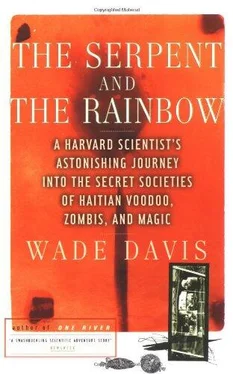Wade Davis - The Serpent and the Rainbow
Здесь есть возможность читать онлайн «Wade Davis - The Serpent and the Rainbow» весь текст электронной книги совершенно бесплатно (целиком полную версию без сокращений). В некоторых случаях можно слушать аудио, скачать через торрент в формате fb2 и присутствует краткое содержание. Год выпуска: 1985, Издательство: Simon & Schuster, Жанр: Старинная литература, на английском языке. Описание произведения, (предисловие) а так же отзывы посетителей доступны на портале библиотеки ЛибКат.
- Название:The Serpent and the Rainbow
- Автор:
- Издательство:Simon & Schuster
- Жанр:
- Год:1985
- ISBN:нет данных
- Рейтинг книги:5 / 5. Голосов: 1
-
Избранное:Добавить в избранное
- Отзывы:
-
Ваша оценка:
- 100
- 1
- 2
- 3
- 4
- 5
The Serpent and the Rainbow: краткое содержание, описание и аннотация
Предлагаем к чтению аннотацию, описание, краткое содержание или предисловие (зависит от того, что написал сам автор книги «The Serpent and the Rainbow»). Если вы не нашли необходимую информацию о книге — напишите в комментариях, мы постараемся отыскать её.
The Serpent and the Rainbow — читать онлайн бесплатно полную книгу (весь текст) целиком
Ниже представлен текст книги, разбитый по страницам. Система сохранения места последней прочитанной страницы, позволяет с удобством читать онлайн бесплатно книгу «The Serpent and the Rainbow», без необходимости каждый раз заново искать на чём Вы остановились. Поставьте закладку, и сможете в любой момент перейти на страницу, на которой закончили чтение.
Интервал:
Закладка:
Nevertheless, I did recognize the need for more samples. But while my backers still sought evidence of a single chemical that might explain zombification, I had become more and more impressed by a people who shared no such obsession with rational causality. I wanted to know the magic; I wanted to know what it meant, especially to its victims. And if the poison explained how a person might succumb, I now wanted to know why that person was chosen.
My first new lead came forty-eight hours after my visit to the Eagle Bar—through a contact in the capital provided by one of Max Beauvoir’s employees, a Jacques Belfort. Beauvoir had never actually hired Jacques. Several years ago he just turned up at the gate of the Peristyle de Mariani, and it happened that Beauvoir had an errand to run. Jacques offered to do it, then he returned and did another. Gradually, errand by errand, he worked his way into the life of the hounfour. Now he appeared each morning at eight, not to set about any prescribed work, but to wait for special opportunities, knowing he could get anything done. Jacques has many wives, and one of them was from Petite Rivière de Nippes, a small fishing village in the south. There, Jacques told me, she knew a mambo who might be able to put us in touch with the ones who could make the powders, both the poison and the reputed antidote, and to whom she would be prepared to take us.
The mambo lived some distance from the coast, on a small knoll rising out of a sad landscape: fields of stones, barren trees and bushes that served for neither grazing nor firewood. It was another of Haiti’s many faces, a place to find hunger.
The hounfour was deserted save for two patients awaiting treatment, and an old woman who was caring for them. Sheltered from the sun by a grass mat sat a beautiful girl, with deep almond eyes and eyelashes thick as fleece. She was dying from tuberculosis. Beside her was a small boy. The joints of mother and son stuck out like knots. Lying across from them near the entrance to the bagi was a middle-aged man whose lower leg was infected with elephantiasis.
Despite their obvious suffering, there was nothing forlorn about these people. The man laughed and welcomed us buoyantly, and the old woman, having made us comfortable in the shade, hurried to her hearth to bring coffee. The stricken man, as if embarrassed by the lack of preparation, hobbled forward and offered a share of his plate of food. I accepted and ate slowly, deliberately, hoping that he would sense my gratitude. There was so much I wanted to say, but out of respect I simply passed the plate on. It was not surprising to see such sickness in the hounfour, which is, after all, a center of healing. But to encounter such generosity and kindness in the midst of such scarcity was to realize the full measure of the Haitian peasant.
We remained with them for much of the afternoon. The mambo never showed up, but Jacques had unlimited patience, and his wife kept busy spreading the news of the capital. Some time around four, Mme. Jacques ran dry and suggested we return to Petite Rivière de Nippes and look up the mambo’s son, a houngan with the name of LaBonté, “kindness.” We found his hounfour without difficulty, and settled in for another long wait. Finally, well after dusk, LaBonté appeared and led us into the outer room of his temple, a small chamber with a single dusty bulb hanging from a cracked ceiling. He claimed to know nothing about zombi powders but offered instead a wide range of benevolent preparations that would increase our love, wealth, and fertility.
Rachel was adamant. “No. It is only one that we want.”
LaBonté countered by suggesting that we purchase a charm, which might accomplish whatever it was we needed the powder for. Throughout this rambling conversation, Jacques stood quietly by the door in his polished shoes and pressed linen, continually wiping his brow and chest with his handkerchief. His wife sat beside him, scrutinizing LaBonté. Suddenly she stepped between him and Rachel.
“Listen,” she said impatiently, “it’s simple. The blanc wants to kill someone. If you can’t give it to him, we’ll go somewhere else.” She turned abruptly, took Rachel by the arm, and made for the door. LaBonté got there ahead of her.
“Something might be arranged,” he said quietly. “But I will have to speak with some people. Come back tomorrow.”
The jeep broke down the next day, so we were delayed a day getting back to the fishing village. The hounfour was empty, and it was an hour before we located LaBonté. His welcome marked by suspicion, he called for three associates.
“You were told to be here yesterday,” he began once we were all together. “You best remember one thing. We can be as sweet as honey, or as bitter as bile. That said, we may begin the business.” It was an unexpected and, for a Haitian, uncharacteristic concern with punctuality.
To prove the efficacy of their poison, one of his associates, named Obin, offered to test a prepared sample on a chicken. An amusing interlude followed as we tried to locate a chicken healthy enough for the test. Mme. Jacques categorically refused the first four, claiming that a gust of wind would blow any one of them over. Finally, she accepted a young robust rooster.
LaBonté maneuvered Rachel and me into the inner sanctum of the temple. There were no windows; the only light was a narrow beam of sun that pierced the thatch roof. One by one the others came, passing briefly through the light and disappearing into the dark. The last figure closed the door behind him and took his place in our midst. A match was struck and the flame reached forward to light first one, then two more candles. Their soft glow revealed the points of a cross, beyond which sat the houngan. LaBonté lifted his hands to the altar and began a prayer for our protection. One of the men passed around a basin containing a pungent solution and instructed us to rub the potion into our skin. Once LaBonté was satisfied that we were safe, Obin sprinkled a small amount of the poison in a corner of the chamber. LaBonté lifted a clay jar of water from his altar and told me to pour a portion of it down the rooster’s throat. Moments later, Obin took the bird from my lap, placed it on top of the poison, and covered both with a rice sack.
From an obscure corner two voices, one gruff and the other strangely sensual, joined in a sonorous chant that filled the chamber. Beside me, the man who had passed the basin started to grate a human tibia. Sweat came to his brow, moistening the satin kerchief wrapped around his head as he too began to sing:
Make the magic Papa Ogoun, Oh!
Make the magic Gran Chemin, Ogoun,
That which I see, I can’t talk about .
Let me go,
Let me go, people!
Let me go.
Rather than die unhappy,
I’d rather die a young man.
Let me go .
I am Criminel,
I won’t eat people anymore.
The country has changed
Criminel says
I won’t eat people anymore .
With the blessing of the songs and his asson, LaBonté selected and sanctified the bottle that would hold the vital potion that would protect me when I administered the poison. I named my intended victim, and he whispered it to the bottle. A machete cracked three times against a stone. Obin pulled four feathers from the rooster’s wing and instructed me to tie them in the shape of a cross while invoking their blessing for my proposed work. The machete rang out once more. Obin led me to the cross, instructing me to make a small offering. I placed a few coins on the ground. Then, as I knelt, he inverted a bottle of clairin, causing it to bubble in a peculiar manner—a certain sign, I was told, that my desires would be fulfilled. A match dropped into the bottle exploded into flames, which for an instant illuminated the entire enclosure.
Читать дальшеИнтервал:
Закладка:
Похожие книги на «The Serpent and the Rainbow»
Представляем Вашему вниманию похожие книги на «The Serpent and the Rainbow» списком для выбора. Мы отобрали схожую по названию и смыслу литературу в надежде предоставить читателям больше вариантов отыскать новые, интересные, ещё непрочитанные произведения.
Обсуждение, отзывы о книге «The Serpent and the Rainbow» и просто собственные мнения читателей. Оставьте ваши комментарии, напишите, что Вы думаете о произведении, его смысле или главных героях. Укажите что конкретно понравилось, а что нет, и почему Вы так считаете.












